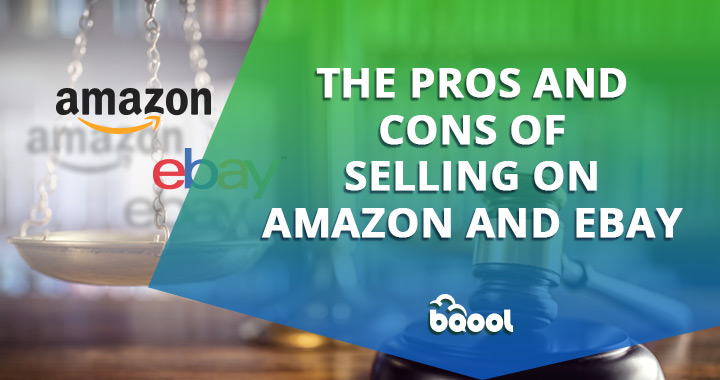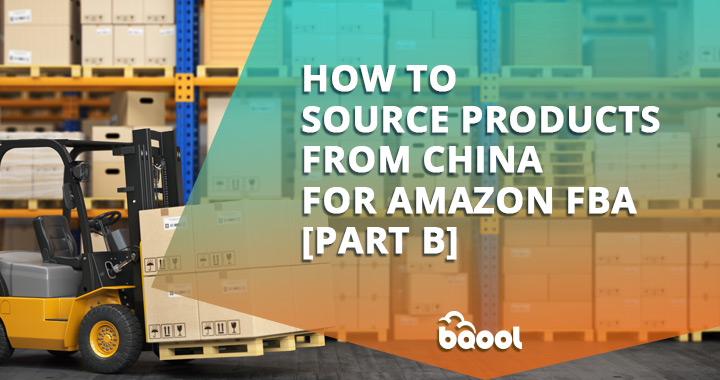The Pros and Cons of Selling on Amazon and eBay

Amazon and eBay are two of the most popular online shopping sites for consumers around the world. If you are planning to run an online store, you should prioritize maximizing your product exposure by selling on a popular marketplace instead of selling on multiple online marketplaces and spread yourself too thin.
But if you were to choose between eBay and Amazon to sell on, which platform will offer you a better selling experience?
Both marketplaces have their advantages and disadvantages, and if you are still unsure which marketplace you want to sell on, this article will help you make that final decision. We are listing out the pros and cons of selling on Amazon or eBay to help you realize which marketplace is more suitable for your needs.
Pros of Selling on Amazon
Selling on Amazon could provide you with more product exposures and give you an easier channel of acquiring new customers.
One of the biggest pros of selling on Amazon is that you can start a store with relative ease since creating an Amazon seller account is simple and straightforward. However, the difficulty of opening a store on Amazon may also depend on the categories you are going to sell in, as some categories would have additional criteria or condition you need to meet before you are granted with approvals by Amazon.
For some people, setting up a seller account on Amazon is easier than setting up their own online stores and warehouses. All you need to do to start selling on Amazon is to create product listings, send your inventory to Amazon’s FBA warehouse, and focus on customer service.
When you sell on Amazon, they will also provide you with the right tools that will promote your products to a more relevant audience who are likely interested in your products.
Cons of Selling on Amazon
Even though Amazon has a large customer base many of which could potentially become your customers, it also has intense competition.
While some competition is fine, what concerns Amazon sellers the most is having their product listings hijacked by their competitors who may cause you to lose sales and even bring negative reviews to your listings.
If you manage to get past through this, Amazon fees and commissions will ambush you around the corner. Amazon fees are known to be expensive at times, and even some established sellers have left Amazon because of this problem.
In addition, even though you might think you’ve reached a whole lot of potential customers, but you should keep in mind that they’re Amazon’s customers and they own the customer relationship, while you’re just a third-party seller who provides a product on their platform.
Pros of Selling on eBay
eBay as a marketplace is very similar to Amazon, but it has its differences, and in some cases, you might be better off selling on eBay.
One of the pros selling on eBay is that its fees aren’t very high and are more reasonable, in comparison to Amazon’s fees.
You are also able to reach a good number of potential customers on eBay by utilizing its promotional tool. There is also less product listing hijackers than you would find on Amazon.
The ability to sell almost anything you wish can be considered just one of the best advantages of selling on eBay, and eBay’s special auction feature can be useful for some businesses.
eBay is a very fair venue to host any type of products, and their way of maintaining the relationship between buyers and sellers is very efficient. It’s fair to say they have very solid seller protection in place.
Cons of Selling on eBay
eBay might seem like a perfect marketplace to post your products, but it has its disadvantages you should be aware of before you start selling your products on there.
Since eBay started out as an auction site where people went to grab bargain deals, even nowadays, eBay still holds the same-old reputation. However, there are always customers who are ready to pay top dollar for high-quality products.
As an eBay seller, you’ll have to operate under their rules which might be considered strict, since you don’t get a lot of control over some of the business aspects. For example, refunds, returns, customer service, and more.
Another thing that has been repeatedly reported by experienced eBay sellers is that the slow shippers have less visibility on the marketplace. The system works by rewarding the sellers who can fulfill their buyer orders fast. eBay prefers sellers to provide the same-day shipping or at least shipping within 1 business day.
And in the end, just like any popular marketplace, you’ll have to deal with a lot of competition in any category. Trying to offer a better price or offer a better deal to the customers can help you beat the competition.
Which Marketplace is Better?
Both marketplaces have cons and pros and if you try weighing them. The best answer is probably both marketplaces are good. What you should understand is that both marketplaces have different systems in place even though they work in a similar way, they’re different.
Therefore, it’s all about making sure your needs are sorted out and that you choose a marketplace that can offer you the best performance and results.
Amazon is sharp on the retail rack and provides tools to third-party sellers with a goal to produce an effortless shopping experience for the buyers.
On the other hand, eBay is the second biggest marketplace that offers the ability to sell products at a fixed price, along with the ability to sell through an auction.
The answer to this question depends on the products you sell, the scale of your operation, and a marketplace that can offer better exposure to the customers in your relevant industry.
You should also keep in mind that nothing prevents you from running your online shop while trying either Amazon or eBay marketplace at the same time. However, make sure you pay attention to your product stock so you don’t sell more than you have available at the moment.








